Ecuadorian mob boss dubbed ‘The Savage’ whose ‘Wolves’ cartel has links to Albanian drugs gangs escapes from jail days after feared Los Choneros leader Fito vanished from cell triggering ‘civil war’ turmoil
Another criminal mastermind known as ‘The Savage’ has escaped prison in Ecuador as the country descends further into civil war between the military and warring gangs.
Fabricio Colon Pico escaped from Riobamba prison in central Ecuador earlier this week with 37 other inmates after armed thugs stormed the prison and took guards and staff hostage.
‘The Savage’ was arrested last Thursday after being accused of plotting to assassinate Ecuador’s attorney general, Diana Salazar, and is already back on the streets after escaping from prison.
Pico is one of the top dogs of Ecuador’s Los Lobos gang, affiliated with Albanian gangsters who help their South American counterparts export drugs to West and North Africa and then to Europe.
Similar to the other cartels, Los Lobos conducts drug trafficking operations, making much of their income by moving drugs purchased by Mexican cartels from groups in Colombia, and then exporting the product from various ports on the coastline of Ecuador.
But the group also controls much of Ecuador’s illegal mining sector, adding to their already enormous wealth.
Savage’s prison escape comes just days after the prison escape of Jose Adolfo Macias, also known as ‘Fito’ – leader of Ecuador’s largest gang Los Choneros – on Sunday.
Fabricio Colon Pico, also known as ‘The Savage’, escaped from Riobamba prison in central Ecuador with 37 other inmates earlier this week after armed thugs stormed the prison and took guards and staff hostage.
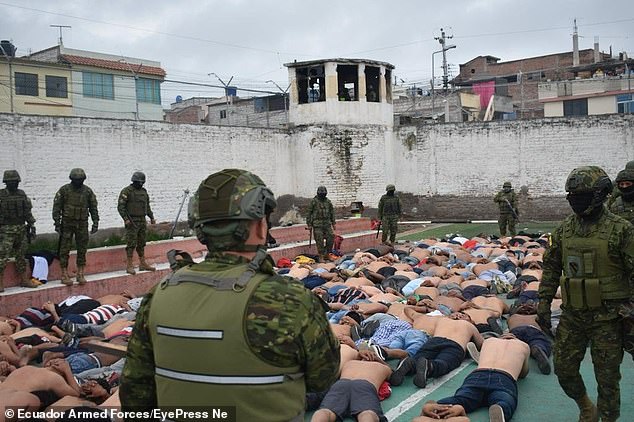
The Ecuadorian army is trying to restore order in at least six prisons where riots broke out earlier this week
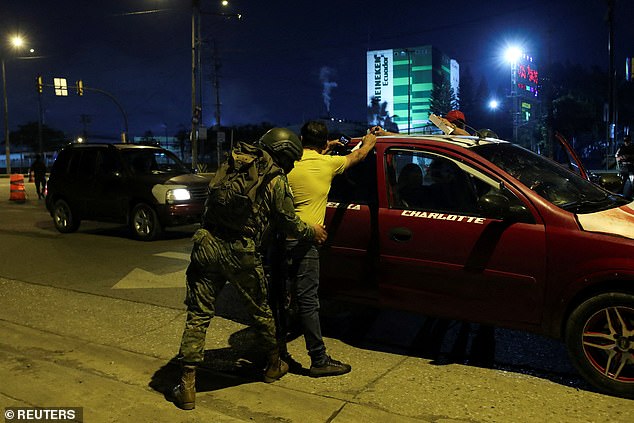
A soldier searches a man at a checkpoint, amid the ongoing wave of violence across the country, in Guayaquil, Ecuador, January 11, 2024
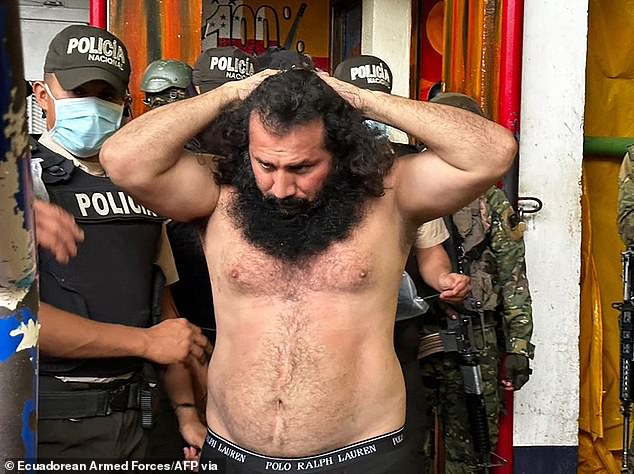
Handout photo released by the Ecuadorian Armed Forces showing Adolfo Macias, aka Fito, leader of the Los Choneros criminal gang
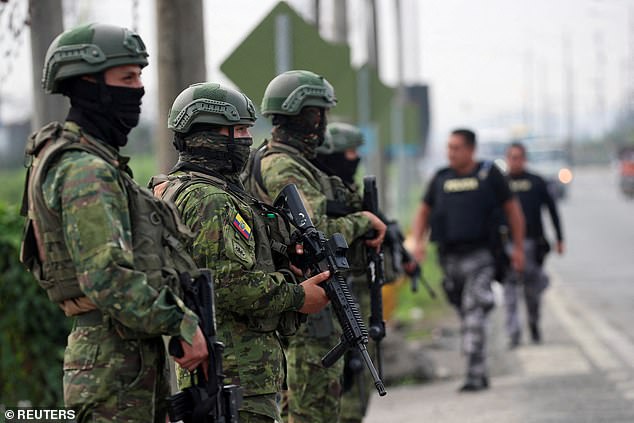
Soldiers stand guard outside the Zone 8 prison after Ecuadorian President Daniel Noboa declared a 60-day state of emergency following the disappearance of Adolfo Macias, leader of the Los Choneros criminal gang, from prison where he was serving a 34-year sentence. Guayaquil, Ecuador, January 11, 2024
Since Monday, drug cartels have been waging a bloody campaign of kidnappings and attacks in response to the government’s crackdown on organized crime, prompting Ecuadorian President Daniel Noboa to declare the country in a “state of war.”
‘Give in to evil: never!’ Noboa, 36, who has been in office since November, said in a televised video message on Thursday. ‘Fight tirelessly: always!’
Ecuador’s armed forces are now engaged in a brutal confrontation with the gangs, deploying more than 22,400 soldiers to put down a gang terror campaign that has already claimed more than a dozen lives and tortured prison staff.
The gangs have also caused numerous prison riots, caused explosions and set fire to cars in public places following their ‘declaration of war’.
Groups such as Los Lobos and Los Choneros work closely with European crime syndicates such as the Albanian mafia and the Italy-feared ‘Ndrangheta’ to export their product.
Albanian ‘capos’ and their henchmen tightly control every link in the trafficking chain, from Ecuador to the end point: the £2 billion cocaine market in virtually every major urban and suburban area of Britain.
Albanians arrived in Ecuador ten years ago, not long after President Correa decided that foreigners could stay for six months without a visa.
In effect, he opened the doors to the Albanian traffickers – for whom the opportunity was too good to turn down.
For many, daily life has become unbearable in many cities, including Esmeraldas and Guayaquil, as protection rackets have driven many shops and businesses out of business.
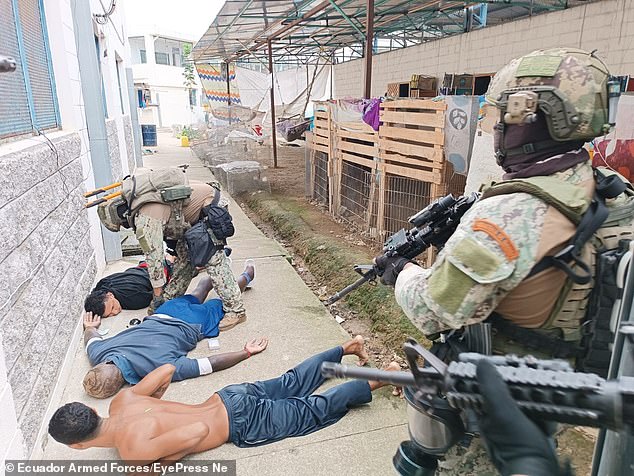
Cuadorian forces are trying to restore order in at least six prisons where riots broke out
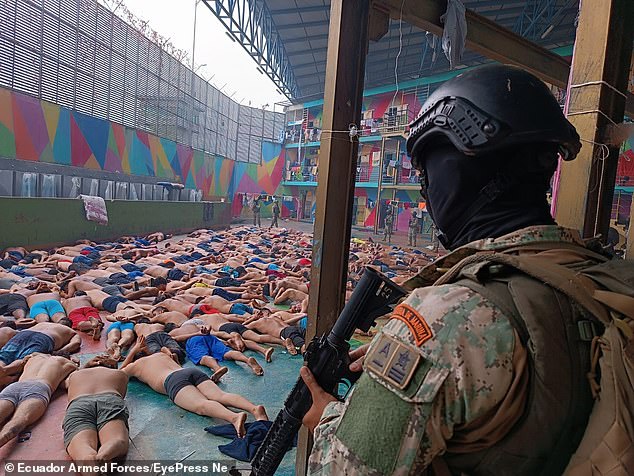
Ecuador’s President Noboa declared there was a major ‘internal armed conflict’ after violence increased earlier this week
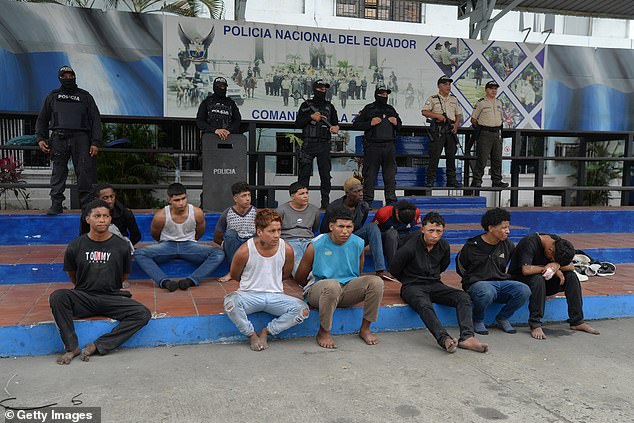
Police present detainees in the case of TC Television raid on January 10, 2024 in Guayaquil, Ecuador
Now, with an armed presence on the streets, land, sea and air patrols, random searches and car searches, prison raids and the enforcement of a curfew, President Noboa’s government has vowed not to relent in its ‘war’ with 22 criminal gangs.
“They wanted to spread fear, but they aroused our anger,” Defense Minister Gian Carlo Loffredo said on social media.
“They thought they were going to subjugate an entire country, but forgot that the armed forces are trained for war.”
Criminal gangs in the country of about 17 million people are believed to have more than 20,000 members.
Police said the death toll rose to 16 late Wednesday following a “terrorist” attack on a nightclub in the Amazon that claimed two lives and injured nine people.
Seven police officers have been kidnapped in recent days, but only one remains in custody.
On Tuesday, balaclava-wearing attackers stormed a state television station in the port city of Guayaquil, briefly holding staff members hostage and firing shots in dramatic scenes that were broadcast live before police arrived.
Thirteen attackers were arrested, many of them young teenagers.
This attack in particular caused panic among the general population, with many people leaving work early, closing their businesses and fleeing for the safety of their homes.
Public transport has been reduced to a trickle, schools and universities are closed and people are urged to work from home, while terrified citizens are bombarded on social media with videos of alleged assassinations of members of the security forces.
Police have not confirmed any executions and insist the videos are part of a disinformation campaign.
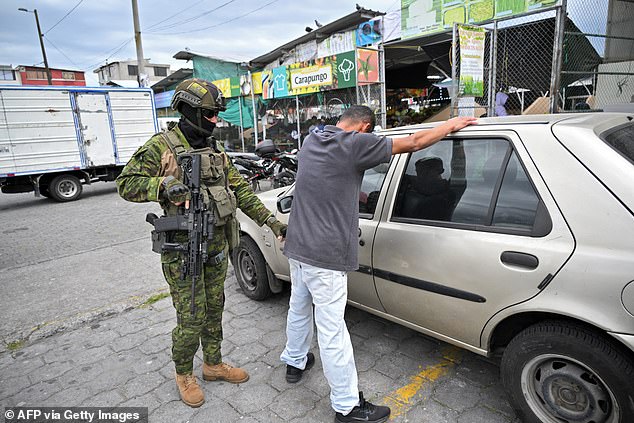
A member of the army’s Elite Forces searches a man during a patrol in the streets of Carapungo, a popular neighborhood in northern Quito, on January 11, 2024
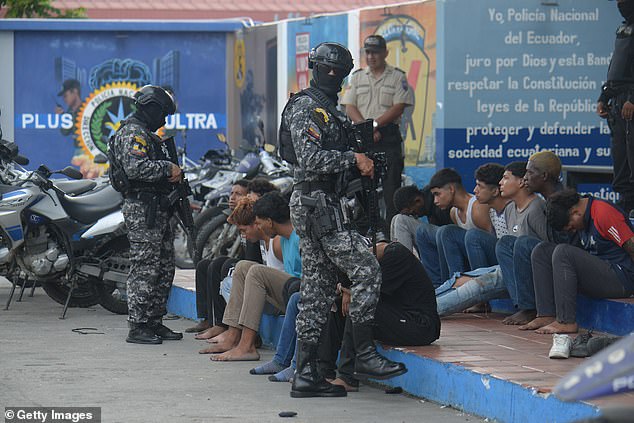
Police present detainees in the TC Television case on January 10, 2024 in Guayaquil
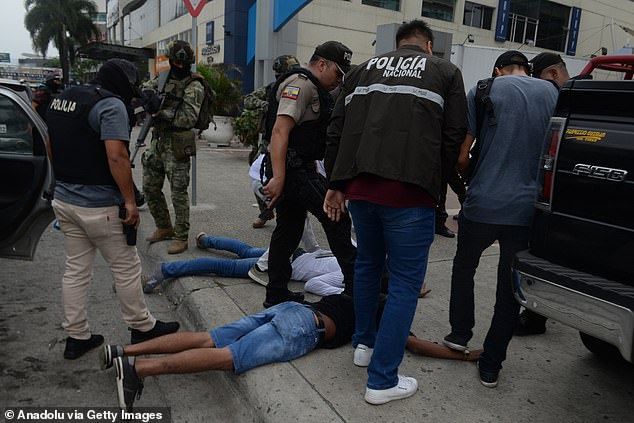
Ecuadorian police arrest several armed men who broke into the set of a public television channel
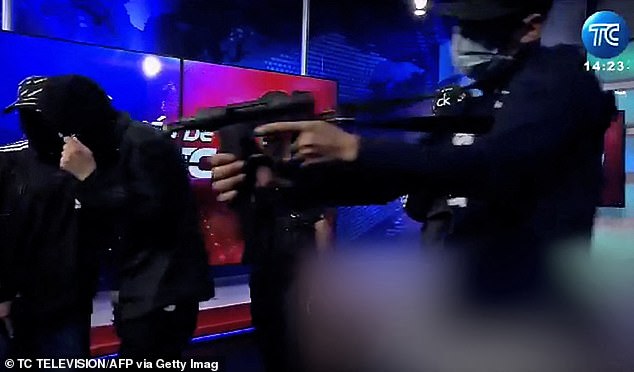
Video recording of live footage from Ecuadorian TC television, showing armed men wearing balaclavas storming the studio of the public television station TC
Noboa has vowed not to bow to the violence and has issued orders to “neutralize” the criminal groups responsible.
“We are in a state of war and we cannot give in to these terrorist groups,” Noboa told Radio Canela on Wednesday.
Hundreds of police and soldiers have been deployed in a manhunt for Fito, and more units are now tasked with finding ‘The Savage’.
The United Nations, the United States, China and several other countries have expressed concern about the violence and offered support to Noboa.
As the drug mafia has gained a foothold in Ecuador in recent years, the number of murders in the country has quadrupled between 2018 and 2022.
Last year was the worst yet, with 7,800 murders and a record 220 tons of drugs seized.
Much of the violence is concentrated in prisons, where spectacularly brutal clashes between prisoners have left more than 460 dead since February 2021, many beheaded or burned alive.
